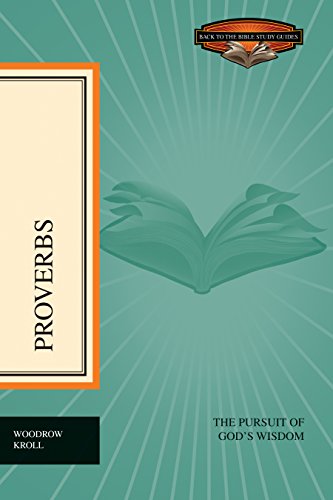Proverbs: The Pursuit of God’s Wisdom
Written by Woodrow Kroll Reviewed By Bálint Károly ZabánThe present study guide on Proverbs includes thirteen lessons, each studying different texts. Each lesson begins with a short summary of its contents. The texts from Proverbs are quoted in full, key verses are highlighted, and section headings attached. Three sections then follow: “Go Deeper,” “Consider It,” and “Express It.” Each “Go Deeper” section is followed by the relevant devotional, out of which a couple of sentences are again separately highlighted. Regrettably, in many cases, the “Go Deeper” sections are unconnected to the actual text singled out for the lesson. Moreover, they sometimes establish scriptural links that have very little to do with the actual content and intent of the passage. For instance, in Lesson 5, the selected passage is Prov 6:1–35, which is surprisingly entitled “The Balance of Fear.” It is noteworthy that the passage does not allude to either the fear of the Lord or the fear of/from humans. The “Go Deeper” section of this lesson specifies that a person who hates the Lord or rejects his Word will show all seven qualities listed in 6:17–19. However, 6:16 talks about what the Lord hates and not what people might demonstrate in their attitudes when hating the Lord.
The study guide is entitled The Pursuit of God’s Wisdom. In the first lesson one learns the reasoning behind this title. Apparently, there are two main sources of wisdom, namely, God and the world. Kroll rightly says that Proverbs and the Bible in general are God’s sources of wisdom. God’s wisdom is unquestionably the right and superior one, whereas the world’s wisdom is “wrong” (p. 12). The reader is invited to take a closer look at what makes worldly wisdom wrong. The reason is summed up in one word, namely, “sin” (p. 12). Indeed, Proverbs is a divine guide that aids in the process of discerning the right choices for one’s life by furnishing wisdom for all situations and circumstances. Nevertheless, on the basis of Proverbs Kroll is mistaken to claim that all wisdom acquired from the world is “wrong” because it is tainted or characterized by “sin.” Proverbs provides no grounds for such a severe antithesis between God’s wisdom and the wisdom of the world or the wisdom gained from the created world. God and the world are not presented as opposing sides. Moreover, Proverbs emphasizes that the sages often gained their wisdom from observing the functioning of the whole world, which was created by God. The sages placed a great stress on the fact that God created the world. This is supported by such passages as 3:19–20; 8:22–31, etc. Furthermore, they also asseverated that wisdom may be obtained from a careful observance of this created universe. For instance, in 6:6–11, the sages adduce wise reflections and teachings from observing the customary habits of the industrious ant. This is not strictly an example of divine wisdom but rather a wisdom that has its roots in the world-order that God created; thus, it may be viewed as wisdom obtained from the world. I can only presume that perhaps Kroll’s intention was more to explicate the existing opposition between divine and “worldly” wisdom, which would have been more accurate from the point of view of the Bible as a whole.
Similarly, the study guide would be more successful if it addressed divine wisdom in contrast to folly, relating the latter to its manifestations in the presentations of the various types of fools who embody folly (cf. 1:22, 32; 8:5; 9:4–7; 26:1–12, etc.), such as the “thoughtless/simpletons,” “scoffers,” “dullards/knowledge-haters,” those who “lack-sense,” etc. All the types of “fools” that are encapsulated in this incomplete list, together with the personifications of the Strange Woman and Folly in Proverbs 1–9, would have provided material for a more accurate summary of the teaching and theology of Proverbs as a whole.
Nevertheless, Kroll’s study guide proves to be invaluable in Lessons 6–13, where the titles are better paired with the passages selected for study. For example, Lesson 8, entitled “Wisdom and Couples,” focuses on Prov 5 and rightly highlights 5:18 as the key verse of the pericope.
Overall, it would be fair to say that Kroll’s study helpfully attempts to draw practical insights for the Christian life from Proverbs, but it often fails to grasp the content and intent of this biblical book.
Bálint Károly Zabán
Queen’s University Belfast, Union Theological College
Belfast, Northern Ireland, UK
Other Articles in this Issue
We want to understand how the power of God comes into our preaching...
Martin Luther was a pastor-theologian. He worked out his theology in the midst of teaching, preaching, participating in public controversy, and meeting all kinds of pastoral needs...
Bearing Sword in the State, Turning Cheek in the Church: A Reformed Two-Kingdoms Interpretation of Matthew 5:38–42
by David VanDrunenAmong the many biblical passages that provoke controversial questions about Christian non-violence and cooperation with the sword-bearing state, perhaps none presses the issue as sharply as Matt 5:38–42...
Does “Christocentrism” betray an asymmetrical trinitarianism that neglects the Father and the Spirit? The spate of calls for “Christ-centeredness” in evangelicalism’s past few generations collude with the twentieth century’s revivified trinitarianism to prompt this question...
feel honored to be able to give this lecture named after John Wenham...







